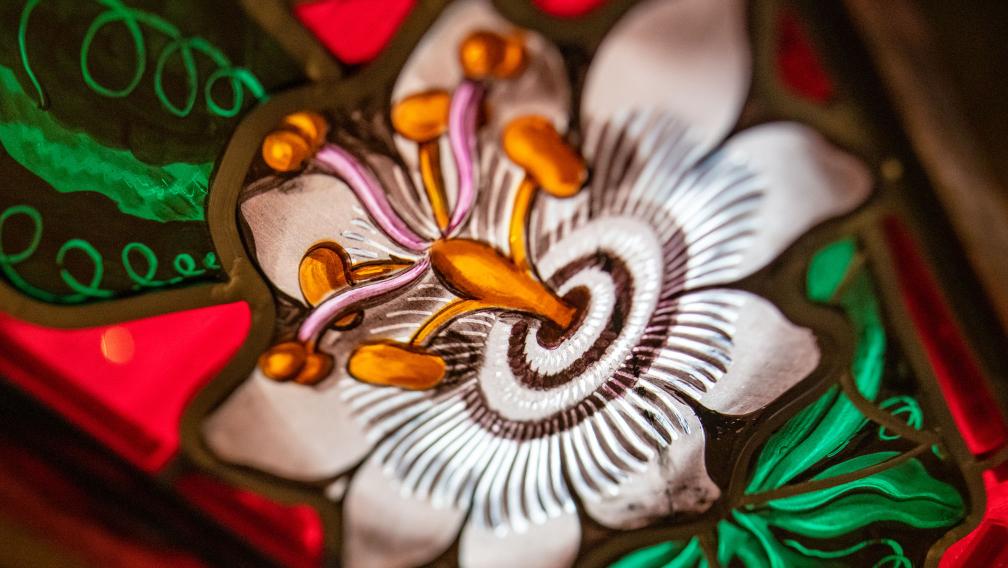Five Ways Into Sunday’s Scripture: The Miracle of Mercy

As Jesus was walking along, he saw a man called Matthew sitting at the tax booth; and he said to him, “Follow me.” And he got up and followed him.
And as he sat at dinner in the house, many tax collectors and sinners came and were sitting with him and his disciples. When the Pharisees saw this, they said to his disciples, “Why does your teacher eat with tax collectors and sinners?” But when he heard this, he said, “Those who are well have no need of a physician, but those who are sick. Go and learn what this means, ‘I desire mercy, not sacrifice.’ For I have come to call not the righteous but sinners.”
While he was saying these things to them, suddenly a leader of the synagogue came in and knelt before him, saying, “My daughter has just died; but come and lay your hand on her, and she will live.” And Jesus got up and followed him, with his disciples. Then suddenly a woman who had been suffering from hemorrhages for twelve years came up behind him and touched the fringe of his cloak, for she said to herself, “If I only touch his cloak, I will be made well.” Jesus turned, and seeing her he said, “Take heart, daughter; your faith has made you well.” And instantly the woman was made well. When Jesus came to the leader’s house and saw the flute players and the crowd making a commotion, he said, “Go away; for the girl is not dead but sleeping.” And they laughed at him. But when the crowd had been put outside, he went in and took her by the hand, and the girl got up. And the report of this spread throughout that district.
Matthew 9:9–13, 18–26
The Hebrew word for mercy (hesed) is rich and polyvalent in that it, at once, describes God’s nature, God’s relationship with God’s people, and God’s requirement for how to live. Jesus’ reference to the central text from Hosea 6:6 (“I desire mercy”) is a key to Sunday’s passage from the Gospel of Matthew. The remainder of the narrative seems to play out as in a movie, showing what mercy looks like.
Mercy looks like sitting at table with those labelled “other.” It looks like health, healing, and life, in place of suffering and death. The way Jesus modeled mercy can serve as a powerful lesson for us, today — a lesson in how to include alienated people, restore relationships, and bless one another with loving presence that transgresses boundaries.
This is the kind of miracle that all of God’s people can perform.
Loving God, Your merciful hand is at work all around us. Open our eyes and our hearts, we pray, to practice the virtue of mercy, wherever there is exclusion and division. Help us to reach out to others in their need and to bear the consequences. Help us to become more like You. Amen.
—Dr. Kathy Bozzuti-Jones
COMMENTARY
On Jesus’ manner of mercy in Sunday’s Gospel reading.
“The danger is that [mercy] may seem to denote a sheer sentiment, without a praxis to accompany it.” This excerpt from the Sisters of Mercy prayerbook outlines the principle of mercy as taught by liberation theologian Jon Sobrino, S.J.
SPIRITUAL PRACTICE
The author of Mercy in the City reminds us that we are Christ’s hands in this world and writes, “We must take on a mentality of mercy…be the embodiment of mercy.”
VISUAL ART
“Can art function as a work of mercy? Can making be an act of mercy in itself?” Learn about Christians in Visual Arts’ traveling exhibit Faces of Mercy.
POETRY
Denise Levertov’s “To Live in the Mercy of God” suggests, to me, that openness to receiving God’s mercy is a precondition for cultivating the virtue of mercy.
INTERFAITH
The first step of growth in mercy is to turn, look, and recognize God in the “other.” A religious diversity calendar can be a good start.
Coming Soon
In Discovery in Summer, join the Trinity community for a parishioner-led study of Paul’s letter to the Philippians on Sundays, June 11–August 27.
This Sunday at 1pm, come learn about Trinity’s Pilgrimage ministry and our two-week journey to the Holy Land planned for May 12–25, 2024.





